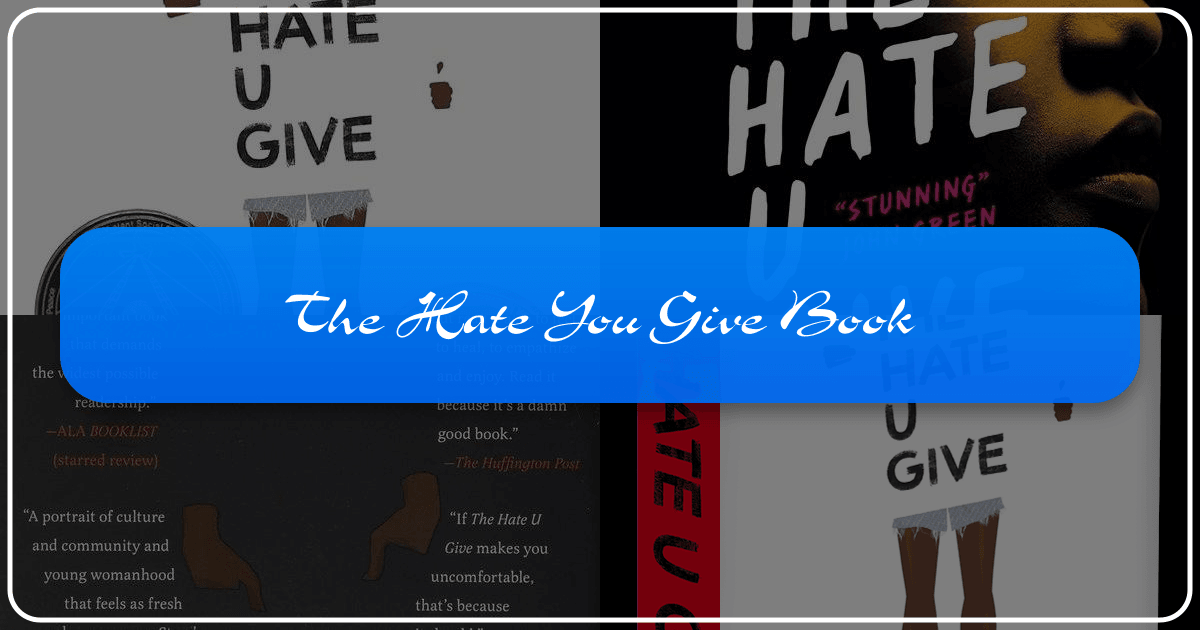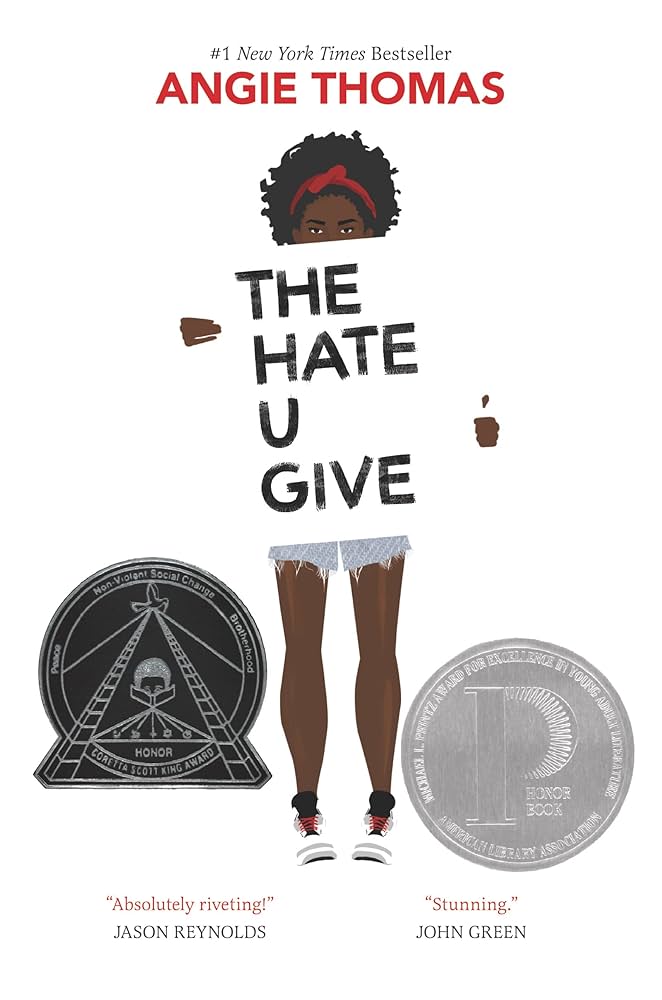The Hate U Give: A Deep Dive into Angie Thomas's Award-Winning Novel

Angie Thomas’s The Hate U Give is more than just a young adult novel; it’s a cultural phenomenon that sparked crucial conversations about race, police brutality, and systemic injustice. This exploration delves into the book’s compelling narrative, its author’s background, and its lasting impact on literature and society, using the framework of key topics commonly found on book-related websites.
I. The Hate U Give: A Literary Analysis
1. Genre and Classification: The Hate U Give is primarily classified as young adult (YA) contemporary fiction. However, its thematic depth and mature exploration of complex social issues transcend genre boundaries. It also incorporates elements of realistic fiction and social commentary, resonating with readers of all ages. Its impactful portrayal of systemic racism and police brutality positions it as a significant work within the burgeoning field of social justice literature. The novel’s success firmly establishes it as a contemporary classic within the YA genre.

2. Plot Summary and Narrative Structure: The story follows sixteen-year-old Starr Carter, a Black teenager navigating two vastly different worlds: her predominantly Black, impoverished neighborhood of Garden Heights and her affluent, predominantly white private school. This duality creates inherent tension and conflict that intensifies when Starr witnesses the fatal shooting of her unarmed childhood best friend, Khalil, by a police officer.
The novel unfolds through Starr’s first-person perspective, providing an intimate and immediate account of her emotional turmoil and moral dilemmas. The present tense narrative heightens the sense of immediacy and suspense, immersing the reader directly into Starr’s experiences. The narrative structure masterfully interweaves the immediate aftermath of Khalil’s death with flashbacks, gradually revealing Starr’s background and the complexities of her relationships. The pacing is expertly managed, balancing intense, dramatic scenes with moments of reflection and quieter, more intimate interactions.

3. Characters and Character Development: Starr Carter is the central protagonist, a compelling and nuanced character who undergoes significant transformation throughout the novel. Initially grappling with a sense of code-switching and feeling torn between her two worlds, Starr gradually evolves into a powerful voice of resistance and activism. Her journey is marked by both internal struggles and external pressures, forcing her to confront her identity, her beliefs, and her place in society.
The supporting characters are equally well-developed, each contributing to the richness and complexity of the narrative. Starr’s family, particularly her parents, provide a foundation of love and support, guiding her through difficult decisions. Her friends, both from Garden Heights and Williamson Prep, represent the diversity of perspectives and experiences surrounding Starr’s central conflict. Even minor characters are carefully crafted, contributing to the overall realism and social commentary of the novel. The character development within The Hate U Give is a testament to Thomas’s skill in creating memorable and relatable characters that readers can connect with on multiple levels.

4. Themes and Educational Value: The novel directly addresses several critical themes with profound educational value:
-
Systemic Racism and Police Brutality: The Hate U Give unflinchingly depicts the pervasive nature of systemic racism and police brutality against Black individuals in America. It highlights the disparities in the justice system and exposes the devastating consequences of biased policing.
-
Identity and Code-Switching: Starr’s struggle to reconcile her identities in different social settings explores the challenges of code-switching, the emotional toll of navigating different racial expectations, and the difficulty of expressing one’s true self without fear of judgment.
-
Grief and Trauma: The novel poignantly portrays Starr’s grief and trauma following Khalil’s death, demonstrating the lasting effects of witnessing violence and the complex process of healing.
-
Activism and Social Justice: The narrative showcases the importance of activism and speaking out against injustice. Starr’s journey towards becoming a vocal advocate for change encourages readers to engage in critical thinking and actively participate in creating a more equitable society.
-
Family and Community: The supportive and loving family dynamics in the novel highlight the importance of family and community in overcoming adversity. The novel explores how strong family bonds and community support can help individuals navigate difficult social realities.
-
Friendship and Loyalty: The different friendships Starr forms and maintains throughout her journey illustrate the complexities of friendships in diverse settings and the importance of choosing one’s allegiances.
The educational value of The Hate U Give lies in its ability to foster empathy, promote critical thinking, and encourage constructive dialogue on vital social issues. Its exploration of these diverse themes makes it a valuable educational resource for both personal growth and societal understanding. The novel’s power lies in its ability to make these often abstract concepts intensely personal and readily understandable.
5. Life Lessons and Reading Habits: The novel provides several key life lessons, including the importance of speaking truth to power, the need for empathy and understanding in the face of differing perspectives, and the strength that comes from community and familial support. The novel’s immersive narrative style can be analyzed to understand how effectively Thomas engages the reader in Starr’s emotional arc; making it an ideal example of how writing styles can influence reading habits and engagement with complex themes. The raw emotionality of the novel also provides a strong example of the power of literature to create both emotional and intellectual impact on readers.
II. Angie Thomas: Authorial Insights
1. Author Biography: Angie Thomas is a critically acclaimed author born and raised in Jackson, Mississippi. Her background significantly shapes the authenticity and power of her writing. Her experiences growing up in a predominantly Black community and her understanding of the complexities of race and identity in the United States contribute to the depth and realism of her work. Her early career as a teen rapper provided a foundation for her literary style, which combines raw emotionality with a powerful, direct voice.
2. Writing Style and Inspirations: Thomas employs a distinctive writing style marked by its raw emotionality, authenticity, and strong character-driven narratives. Her use of vernacular language reflects the realities of her characters’ lives and brings a sense of immediacy and authenticity to their voices. The strong first-person narrative perspective allows readers to intimately experience the emotional journey of her protagonists. Her work is inspired by her personal experiences, her observations of social injustice, and her desire to tell authentic stories that reflect the realities of marginalized communities. Her skill in combining profound social commentary with compelling narratives has garnered her significant critical acclaim and a dedicated readership.
3. Famous Works and Literary Influence: The Hate U Give is Thomas’s debut novel and it catapulted her to international recognition. Its success led to the publication of subsequent novels such as On the Come Up and Concrete Rose, all of which explore similar themes of social justice and racial identity within compelling narratives. Her work has garnered numerous awards and honors, including the Walter Dean Myers Award and the William C. Morris Award. Thomas’s literary influence is significant, particularly within the YA genre, where her authentic portrayal of diverse characters and her impactful exploration of social issues have paved the way for a more inclusive and representative landscape. Her works show the influence of classic young adult novels that explore complex social themes through the lens of adolescence.
III. The Hate U Give: Cultural Impact and Legacy
1. Literary Influence: The Hate U Give has profoundly impacted the literary landscape. Its success has brought increased attention to YA novels that address social justice issues. It has also inspired a wave of new authors who are writing authentic and representative stories that challenge conventional narratives. The novel has become a staple of reading lists in schools and universities, promoting conversations about systemic racism and encouraging young readers to engage in critical thinking and social justice activism.
2. Adaptations and Awards: The novel’s success has led to a major motion picture adaptation, starring Amandla Stenberg, which further expanded the reach and impact of Thomas’s story. The Hate U Give has also received numerous prestigious awards and recognitions, further solidifying its position as a seminal work within contemporary literature. These include, but are not limited to: Printz Honor Book, Coretta Scott King Honor Book, and multiple New York Times Best Seller rankings. The awards demonstrate the critical acclaim and the broad recognition of the novel’s literary significance.
3. Communities and Social Impact: The Hate U Give has fostered significant discussion and engagement within communities across the world. Its exploration of pertinent social issues has spurred conversations in schools, libraries, community centers, and book clubs. The novel has become a catalyst for social justice activism, inspiring readers to take action and work towards a more equitable society. This strong engagement demonstrates the transformative nature of effective narratives in sparking dialogue and catalyzing action towards social change.
4. Archives and Rare Collections: While it’s too early for The Hate U Give to feature prominently in rare book collections or archives, its impact ensures that its preservation and accessibility will be carefully managed by both commercial and academic institutions. As a contemporary classic, its place in literary history is secure, and copies of first editions and signed copies are likely to increase in value over time, becoming notable inclusions in book collections.
In conclusion, Angie Thomas’s The Hate U Give stands as a remarkable achievement in contemporary young adult literature. Its powerful narrative, authentic voice, and impactful exploration of critical social issues have earned it widespread acclaim and a lasting legacy. Its impact extends far beyond the realm of literature, influencing social discourse and encouraging readers of all ages to engage in critical self-reflection and social justice activism.